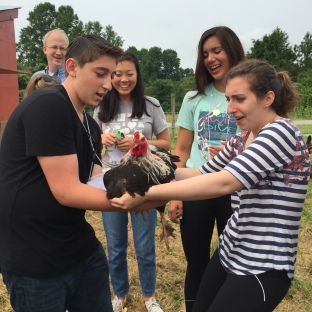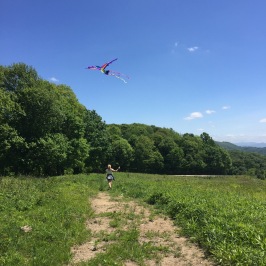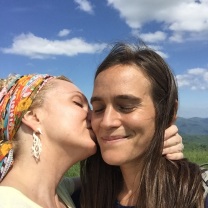Now, where are you going again? That’s the question we get most often.
When we first started this journey, I’d simply list our event locations in the order in which we’d plan to travel, ticking off the calendar in my head—well, this March we’ll start in Birmingham. Then on to Iowa City and Lawrence, Kansas. Then we have a few things in Little Rock, then AWP in Minneapolis. . . after that, we hit the road for real this summer, first to Asheville, then up to Tennessee for the Sewanee Young Writers Conference, then to teach at Murray State’s low-residency program and at Poets House in New York, then—oh, yes—a blissful week to write in Western Massachusetts, that will be a welcome break. After that, three readings in Provincetown and then events and workshops in Boston, Buffalo, Colorado, Taos, and Santa Fe. . . . After that, we head home, but we’ll still head out for a few more few more jaunts, to Rochester, Minneapolis, Columbia College Chicago and Charleston South Carolina, and then there’s Salt Lake City, Delray Beach, Sanibel Island, and oh, here’s some great news—we’ve been asked to teach in Thasos, Greece, next summer. . . .
That answer, I quickly figured out, was definitely not the best approach. It required me to align the logistics in my head with a dizzying, carnival ride of a shuffle that made even me nauseous, and worse, the answer was the equivalent of info dumping, making the inquisitive friend sorry for even asking. Now, if the one I was talking to didn’t excuse themselves and sneak off to another corner of the proverbial bar, they were left with the conundrum of how to respond. . . . And there are two basic choices here, either enthusiasm or dismay. The irony, no doubt, is that I still can’t choose exactly how I feel myself.
Because despite each event that goes well—each city that we drift through without experiencing theft or flat tires or a flu that leaves us curled on the floorboard for days—that dismay—that downright fretful what-the-hell-were-you-thinking response—never quite dissipates.
It isn’t only this break-neck, beat-the-streets book tour that splits my nerves at times, but of course, my recent resignation from my tenure-track job. I mean, all writers understand how hard it is to get a full-time job teaching poetry, and anyone who knows me remembers how hard I worked to get my job. It seems crazy, downright ludicrous, to let that kind of security go. And there was nothing wrong with that job, truly, no batshit crazy colleagues or unreasonable committee work; just a good, steady opportunity to teach poetry to some good and (mostly) steady bunch of students.
But Jessica and I? Well, we sat down, looked at the numbers, and realized that if we live simply with our savings, we can manage by teaching guest workshops, taking on freelance editorial work, and holding low-residency positions, as I do now at Murray State. It was the plan we made, and even though this career-jolting announcement garnered a ridiculous amount of “likes” on Facebook, in reality, it leaves most of my colleagues and friends a tad incredulous.
When they ask about this move, I reassure them I’m fine, say, really, we’ve thought everything out, but at the same time, I’m also reassuring myself. And when natural suspicions arise, I halt them best I can, say, No, everything was great at my university; I’m going to miss my colleagues and my students just terribly. And I do miss them, keenly so. I say, I was actually coming up for tenure early. I say, I can’t tell you how difficult a decision it was. Because it was a difficult decision. I love teaching, deeply so, and UALR was good to me.
So I say difficult, but it’s in a way that makes it a silly, inadequate word, something wearing mouse ears in the long, crowded line at Orlando’s airport. I won’t go into the details, but let’s just say that once that last long semester was over, once Jessica and I arrived in the green promised land of Asheville this past May, I promptly curled fetal and set my own weeping raincloud as a crown above my head. The darkness was palpable, grainy and deep; the fear thick enough to eat with a spoon, each mouthful sticking like wet newspaper in my throat. I couldn’t convince myself that I deserved this life, that I would ever write a word again, and to be honest, I didn’t write anything remotely worth keeping until a solid two months later—until now, really, on a friend’s fiber farm in Western Massachusetts—when I quit my quivering and gave myself permission to give this life a try.
You see, folks ask the question—Again, now tell me where you’re going? —and after I give them an answer (albeit a much-abbreviated one now), sometimes they reply with the word brave, but behind that adjective is worry, something in their eyes letting me know brave is the flipside of foolish. Perhaps they realize the only other people they’ve known traipsing around the country this much were either following The Dead or were in a garage band of some sort, a motley crew of hygienically-challenged boys who survive on a steady diet of Taco Bell, PBR, and truck stop coffee.
With friends who know me well, their worry shines through in a bevy of follow-up questions—Now, where are you going to sleep again, in the back of your Honda Element? On a fold-out futon, you say? Well, what about health insurance? And what about a doctor if you need one? And your pets at home? Who’s taking care of them? And how are you packing enough clothes for all those climates? I mean, you’ll be traveling into autumn, right? And how do you arrange these readings? I mean, who is handling all these details for you? How can you keep track?
I’ve got suitable, pragmatic answers for all of these questions, but I won’t bore you with them here. If you ask me if this is the right decision, well, I can give you that answer, but not until a few years from now. I will tell you that I believe it’s a lot easier to regret the things you didn’t try than the things you did. Jessica and I are trying to make time—not our careers, teaching or otherwise—our sacred asset, and this was the only way we could figure how to approach it. We’re not sure how it’s all going to pan out; it’s a test of faith and a blind leap. But I swear, things are coming back to me, swiftly, and I’m experiencing time again, as only I did when I was a child. Opening our lives in this way, as hectic as it may sound, has created a void for poetry to enter, an empty space that accepts creativity as it is—unnecessary, elusive, impossible to force.
Take this morning, for example. I remembered the word scythe. Jesus, isn’t that a beauty of a word? I wrote it down in my much-neglected notebook and watched it slither, sounding of tall grass cut with one muscled, shining blade. It’s housed in the same box with absinthe, a word that also shushes with dreaming, so I wrote that down too. I hardly call that a poem, but there you go. Then, of course, after I sat a while, came ardor, a word I used to carry around with me like a raw almond under my tongue. The ardor I used to have for poetry, and now, after all my scrambling and procrastinating and self-pity, that old love returns to me, tentatively, but bearing gifts. In one hand, she holds the quivering of pigeons in the darkness of the rafters in the barn here. In the other, the delicate popping of roots—basil, maybe, or young dandelion greens—the whole plant eased from the dirt.

At the Leverett Peace Pagoda.
In short, I’m not sure how we’ll hold it all together, but I’m learning. Learning to pay attention, learning to let go. Learning, most importantly, that poetry is real and valuable work in this world, and even though it makes me feel like a fool, I accept my chance at this position. I thank my wife for giving me courage to jump, for holding my hand even when I became afraid and began to let go of hers. I also thank the moon, as goddess-silly-new-age-crap as that sounds. The night before last, it was the second full moon in a month—a blue moon, to be precise—so bright that even out here, miles from the nearest town, I could follow the silvering of birch leaves turning in the wind and stopped to bury myself in the milky fur of the white dog here at this farm. He’s a Maremma Sheepdog, and I don’t exaggerate to say that white dog was glowing just like a ghost I saw once as a child, a big ghost of a dog guarding the top of the stairs. He kept me safe then, and he keeps me safe now. I know this doesn’t make sense, so let me say this plain, let me get back to the moon that night, the way it took pity on me, the way she finally moved the churning waters back. I’m not drowning or sinking to the bottom of the sea, no. Instead, I find myself on this empty expanse. It’s no place, not exactly. But with all the wrack cleared away, it’s everywhere I want to be.



 I found myself a little short of breath, probably due to standing around in the cold, but I tried to trust in all the elevation training I’d done and push hard up the hill. It seemed to work, as I settled into a quiet little pocket–the lead pack ahead, the rest of the runners behind–where I remained for pretty much the entire race.
I found myself a little short of breath, probably due to standing around in the cold, but I tried to trust in all the elevation training I’d done and push hard up the hill. It seemed to work, as I settled into a quiet little pocket–the lead pack ahead, the rest of the runners behind–where I remained for pretty much the entire race.
 So let’s begin with the basics. The
So let’s begin with the basics. The 














